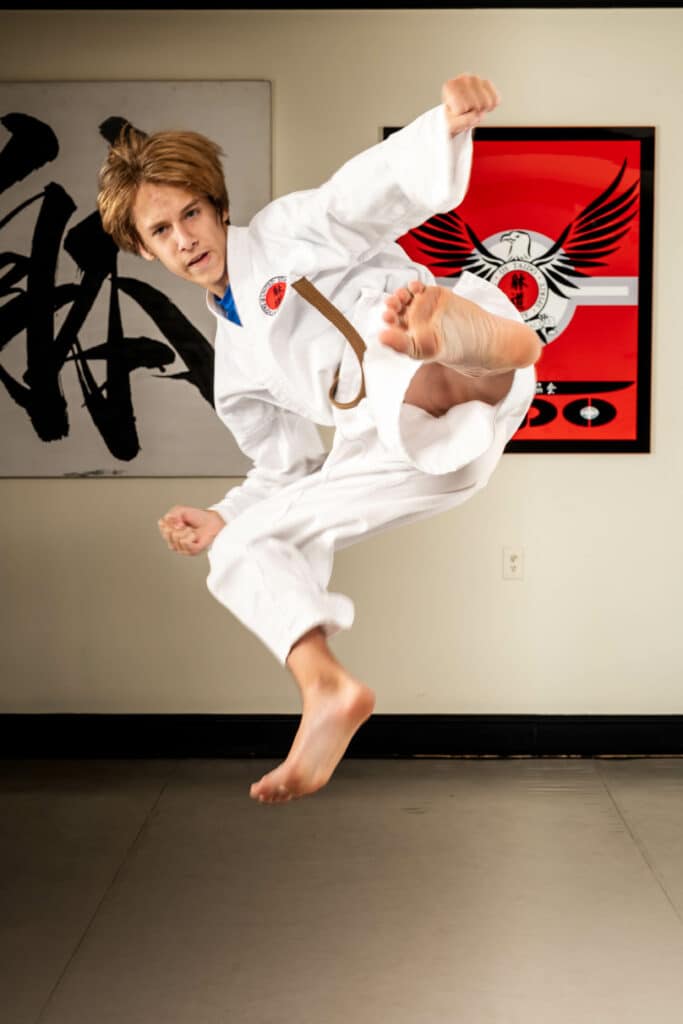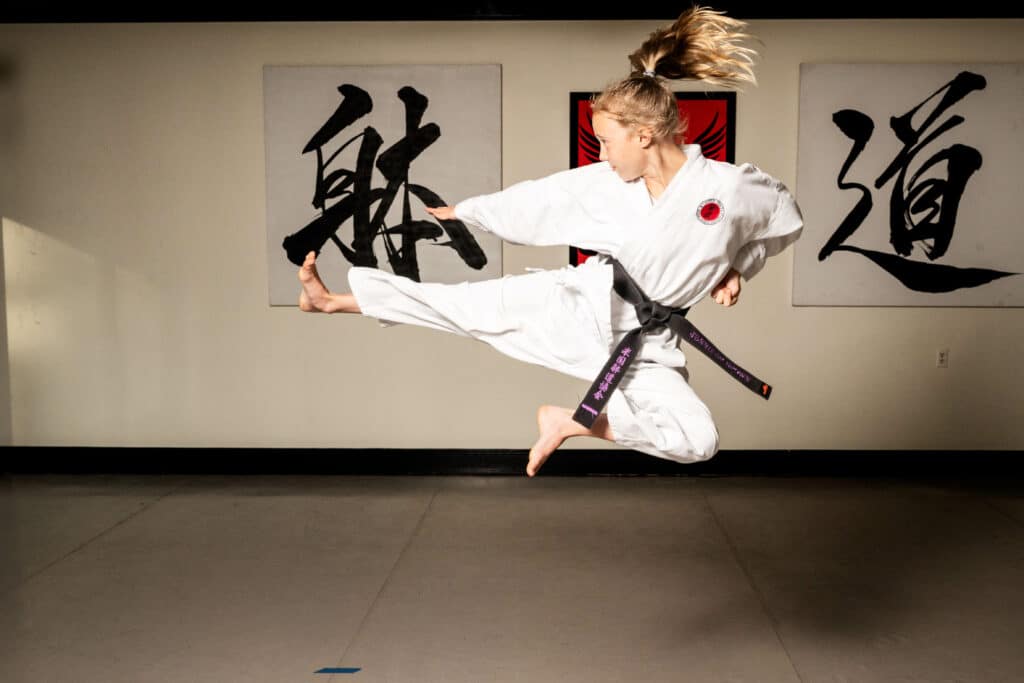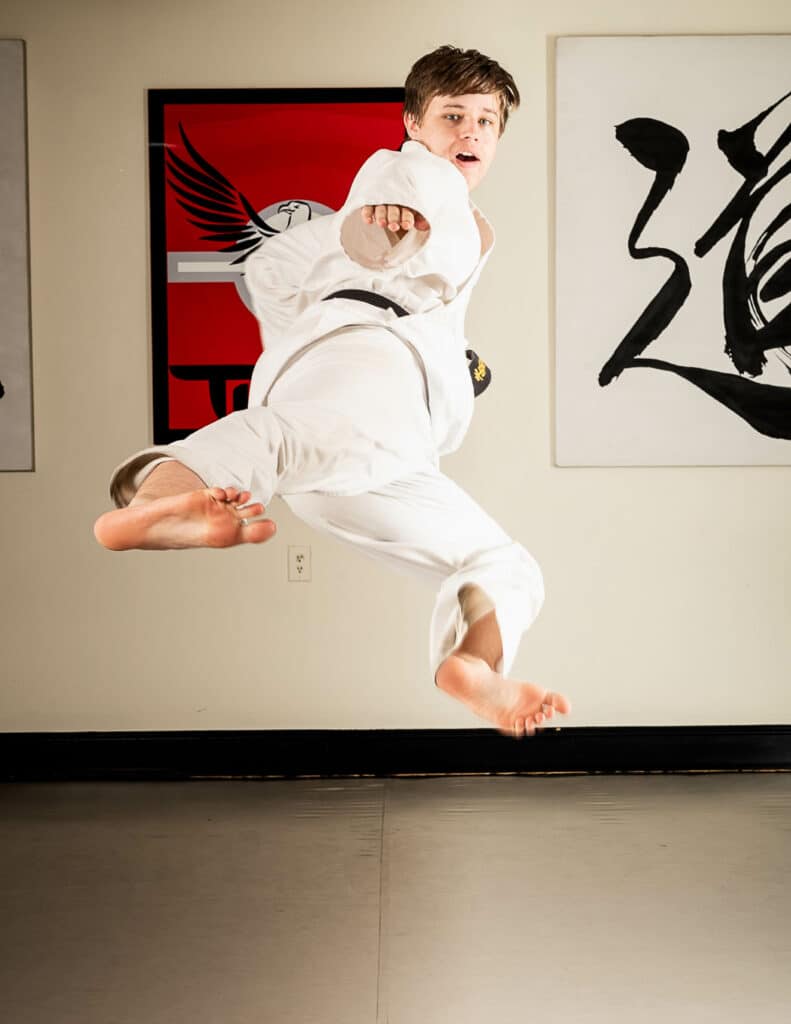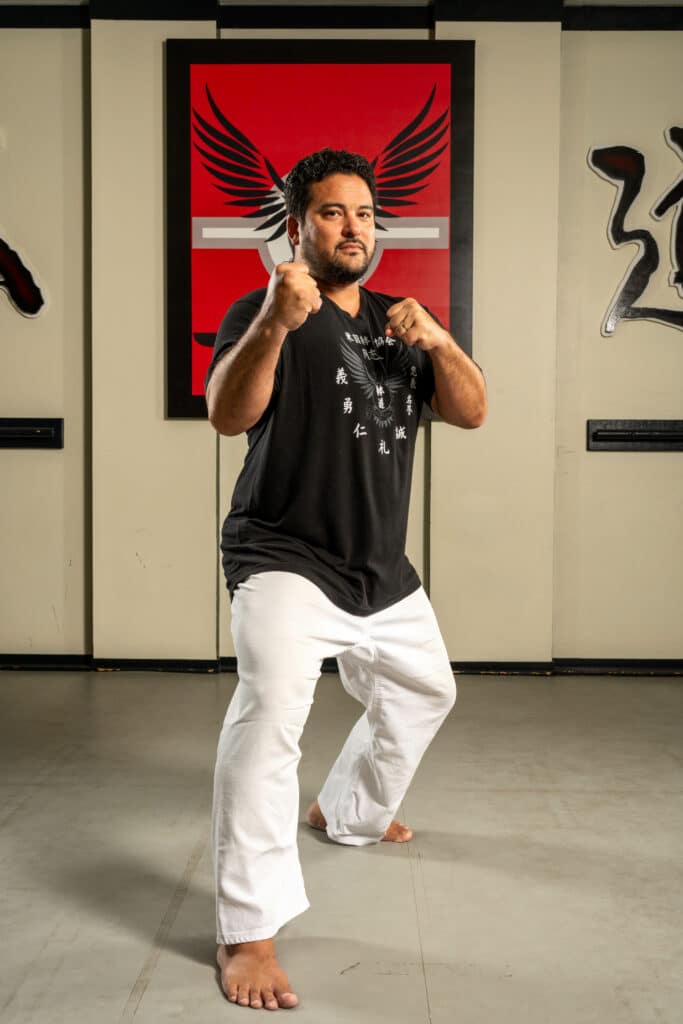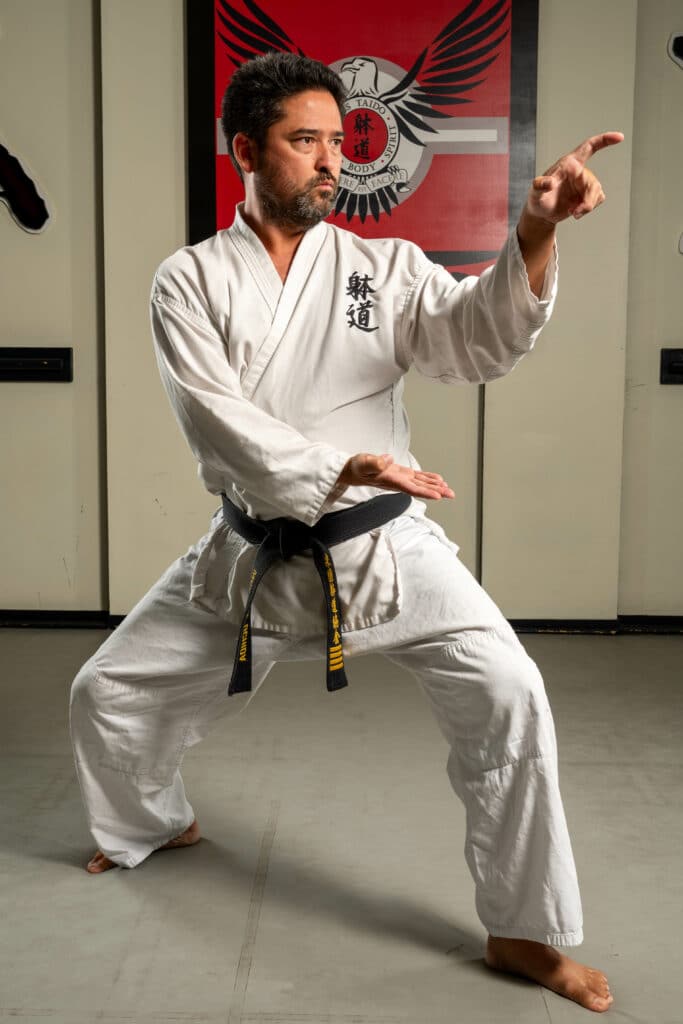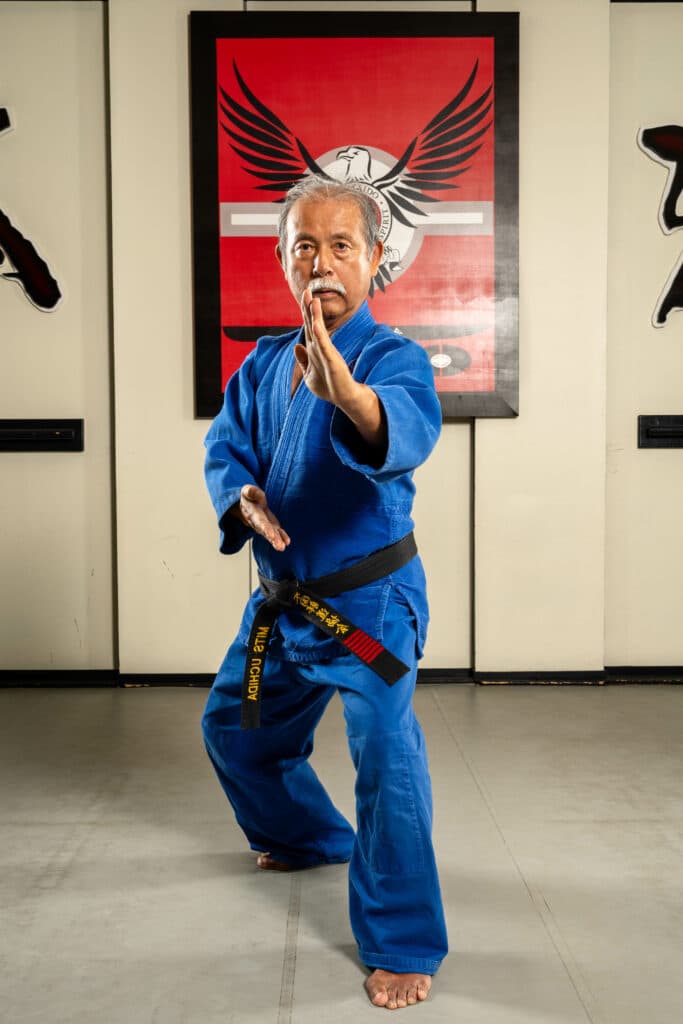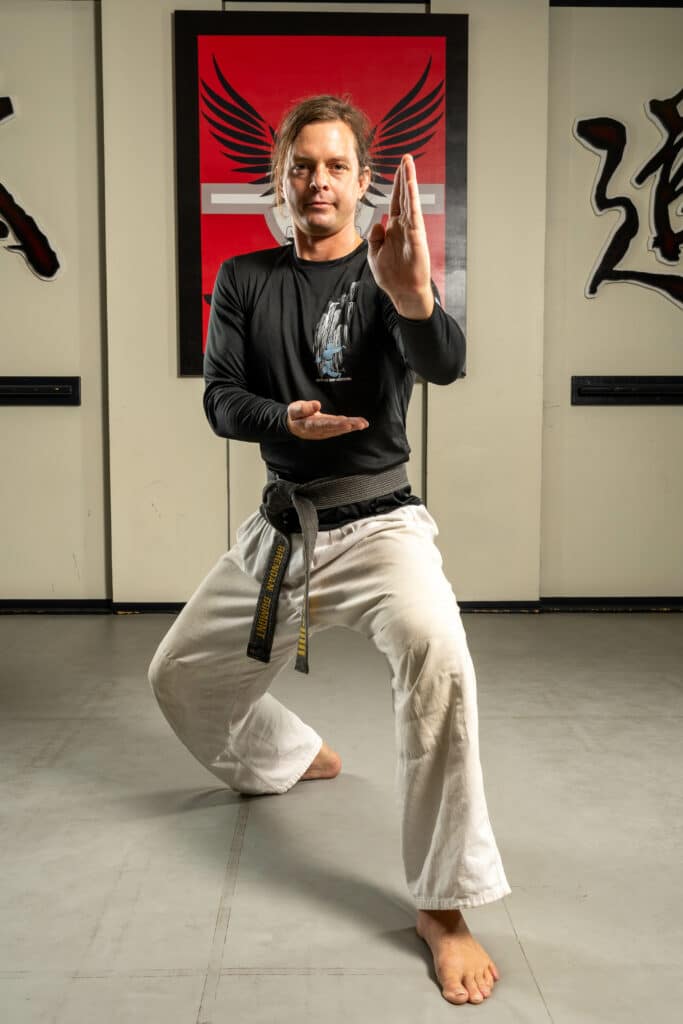Business
The Karate Kids
Published
3 years agoon
By
Kris Bird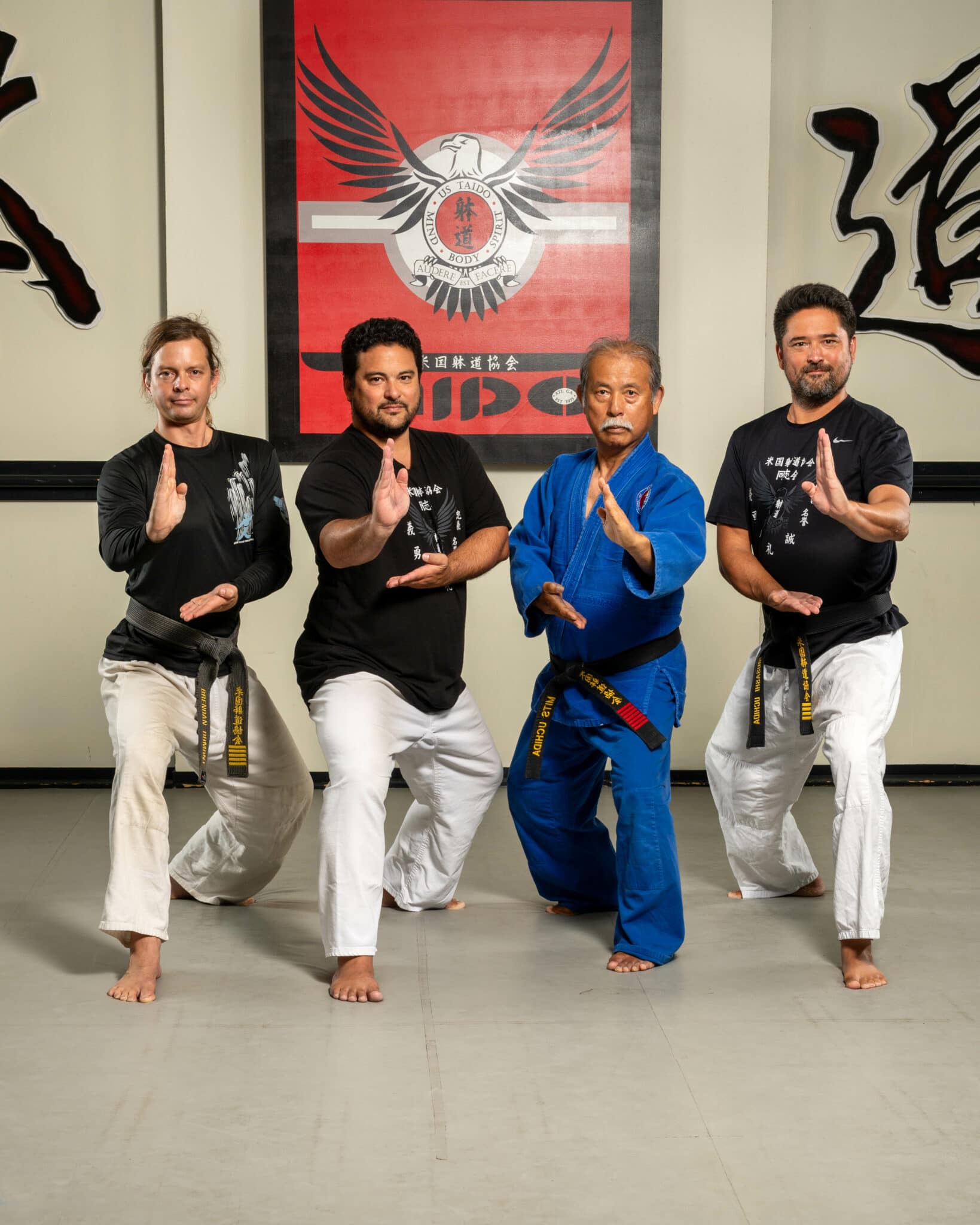
Photos by George Hunter
The students at Taido Karate Dojo in Peachtree Corners get to live every 80’s kid’s fantasy. They get to learn the patience and discipline of the ancient art of karate from a real-life Mr. Miyagi.
Stepa Kolkov Jennifer Brown Connor Kenworthy
Ever since Mitsunobu Uchida was in grade school, he had a dream to one day move to America and teach karate. He knew that Americans loved organized sports, and karate not only gives you a great aerobic workout, but it also teaches you discipline unlike any other.
His father told him that he should move to Georgia, because the climate there is very similar to the one in Japan. So, in 1970, Mitsunobu moved to America to attend college in Nebraska, and eventually settled in Georgia — the land of “Gone with the Wind.”
Mitsunobu fulfilled his lifelong dream in 1975 by opening his first dojo in Doraville, Ga. Then in 1986, the dojo moved its location to Peachtree Corners, where today it stands on Spalding Drive as the most popular dojo in the Atlanta area.
Over 40 years later, two of his sons now help him run Taido Karate, bringing the words “family business” to a whole new level. Mitsunobu still serves as the Grand Master, with his son Mitsuaki as the General Manager, and his other son, Musashi, as the Assistant Manager. Not to mention Brendan Dumont, a 5th-degree black belt who has been the Head Instructor at Taido for so long that he feels like family.
Family extends into community
The Uchida family growing up in Peachtree Corners was not only a great influence on the community, but it made for an interesting childhood worthy of any box office screen. Mitsunobu never taught anyone to wax on, wax off, but he was once quoted saying “it’s raining dogs and cats outside.”
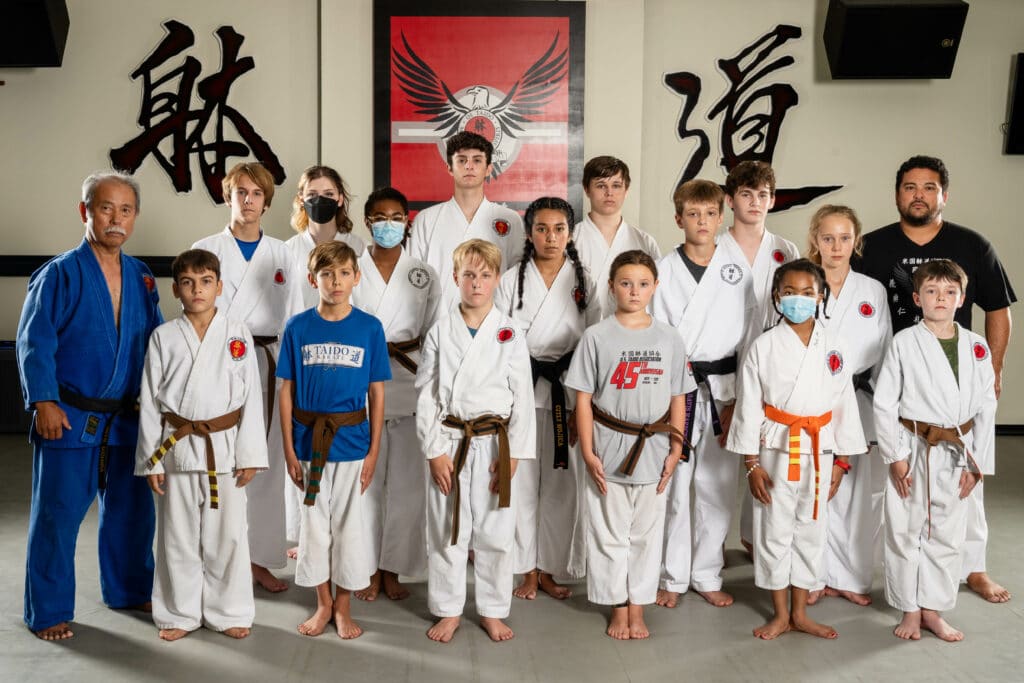
And did we mention that all of his four sons are black belts? The boys each attended Pickneyville Norcross High School where his son Mitsuaki has fond memories of being able to show off his gymnastic skills in front of the cheerleaders. “We would walk into the gymnasium where they were holding practice, and just bust out a roundoff,” he said. “They would be so impressed, and that’s when we would tell them that so much of karate is similar to gymnastics.”
Taido Karate now boasts three generations of students. There are those who learned under the tutelage of Mitsuaki’s grandfather, then his father, Grandmaster Mitsunobu — and now even Mitsuaki is teaching the children or grandchildren of those same students!
The dojo has truly become a pillar in the community of Peachtree Corners, and they say that their favorite part about America is how diverse and wonderful the people are, especially the city of Peachtree Corners. “I think people feel comfortable with being a part of something run by an interracial family [half Japanese, half American],” Mitsuaki said. “We never pushed to be diverse because we never needed to.”
Now Mitsuaki notices whenever there is a Muslim or Jewish holiday, because large chunks of the class will suddenly be missing. Taido is truly a melting pot of the American dream, where all races and nationalities can come together and learn all the fulfillment that karate can give. He jokes that there was a surge in students after the famous 1984 flick, but the biggest drop in attendance they have seen was during the pandemic.
Meeting the pandemic head-on
Before COVID-19, Taido Karate had over 400 students in attendance; within a few weeks, that number dropped to zero. So, with some quick thinking, they switched the entire program to 100% online Zoom classes for April and May of 2020. “We received an overwhelming amount of support from the community, and so many wonderful emails from parents during that time.”
The parents of the Taido Dojo were extremely grateful that the Uchida family kept classes running for the kids and gave them something to do at a time when parents were going nuts.
Then in June of 2020, the dojo decided to reopen their in-person classes and combine them with the online sessions. Mitsuaki recalls that confusing time in the dojo’s history, “It reached the point where there was so much information out there, you could literally go online and find whatever you wanted to support your theory, so we decided to do what made sense for us.”
Mitsuaki Uchida Musashi Uchida Mitsunobu Uchida Brendan Dumont
They kept the students six feet apart, allowed them to decide whether or not they wanted to wear masks, and over a year later they have a record of zero reported cases of COVID in the Taido dojo.
Currently, the Zoom class has been completely phased out, because almost the entire roster has decided to come back for in-person training with the Uchida family. But while the class size has returned to normal, they are still waiting for churches to open up — that’s where they hold competitions — so students can return to competing in tournaments.
Champions here and in Japan
While there are some similarities between the Taido Karate dojo and that famous tournament movie scene, there is one thing that Daniel LaRusso never got to do, and that is compete in in a worldwide tournament in Japan.
Every four years, the students of Taido Karate get the honor of traveling to Japan with their families to compete in worldwide Karate championships. Just like a mini version of the Olympics, the International Friendship Tournament switches off with the Japanese team, and every two years they come to America to compete, while the other two, the American team comes to them.
A total of 90 American students, plus their parents, travel together in a skillfully coordinated journey planned by Mitsuaki himself. Among many hurdles to overcome, he jokes that the hardest part of planning a trip that large was navigating the train system in Japan.
“It was like the Titanic,” he said. “The trains in Japan only stop for 60 seconds and that’s all you have to get 100+ people on board with their luggage. So we would have women and children enter one car while the men would throw all of the luggage into another car. It was crazy, but fun!”
The best part about the students getting to tour the country with a real Japanese tour guide, is that they get to experience the culture firsthand. One of the black belt students even ended up loving Japan so much that he moved there and is still living there today with his Japanese wife.
Mitsuaki boasts that they even won the Championships once while in Japan, and it was a great moment for the Taido team. The last tournament got cancelled three days beforehand due to COVID, and Mitsuaki has had all the trophies packed away ever since.
The Taido Karate family and their many students are eager to get back to competing in tournaments, including the World Taido Championships that will compete in Japan and Europe as soon as they receive the go-ahead.
Even if you’re not a Karate fan, you can surely appreciate the family legacy that the Uchida family has brought to so many generations of Peachtree Corners residents.
Related
Kris Bird is an Atlanta-based freelance writer who specializes in Marketing and Communications. After earning her degree from Stony Brook University, Kris has been working as a science fiction and fantasy novelist for the past decade.

Business
The Forum Gives Sneak Peek of New Eateries and Community Spaces
Published
2 days agoon
July 24, 2024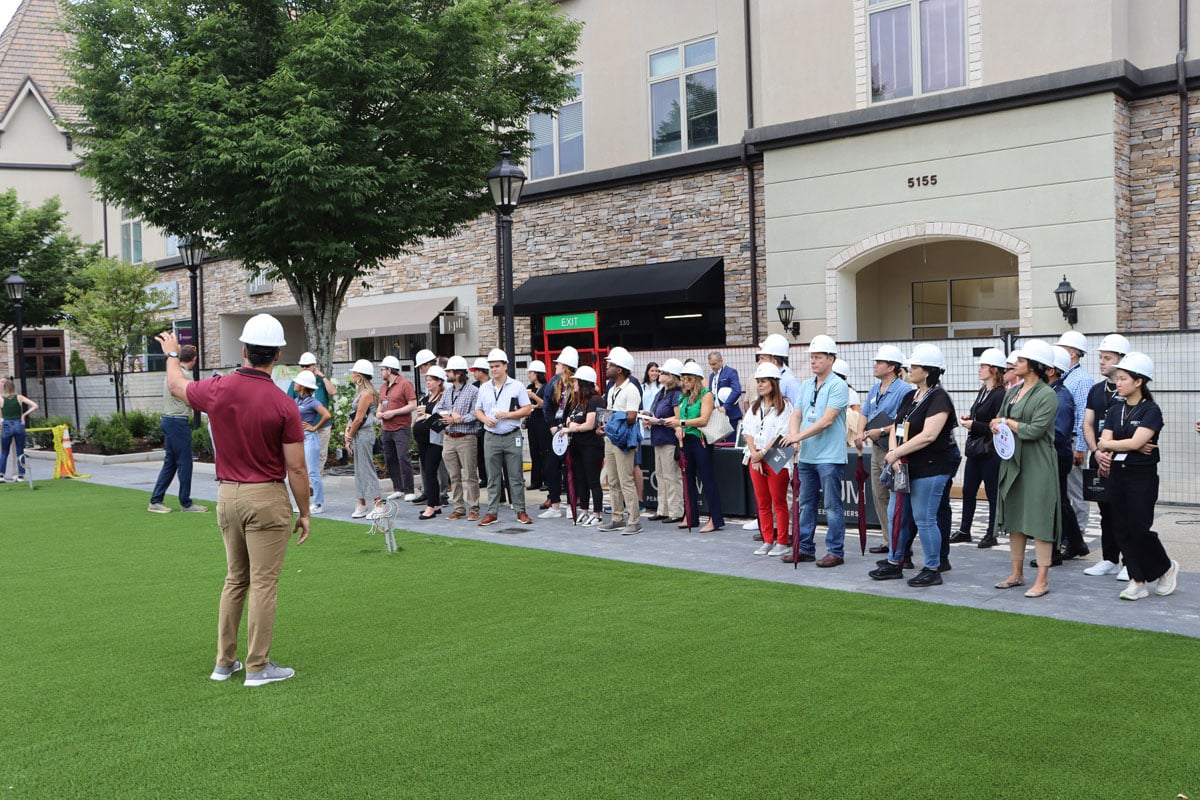
If you’ve been to or near the Forum in the past few months, you’ve probably noticed cranes and construction crews. The anticipation of the first phase of renovation of the 22-year-old retail center has left a lot of Peachtree Corners residents as well as nearby patrons excited to see changes.
The Forum administration invited the media for a hard hat tour on July 17. The event showcased the redevelopment progress ahead of The Plaza’s grand opening on Aug. 8.
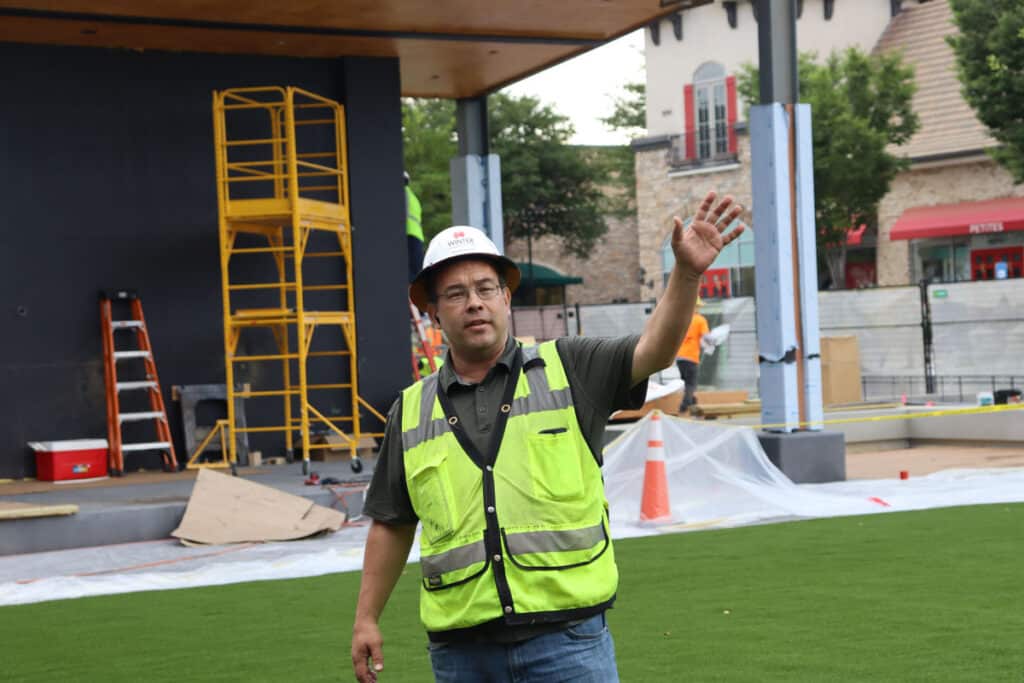
Scrumptious bites incoming
Executives from the development and leasing teams joined on-site management and led attendees around the new central gathering space, guest amenities and Politan Row, the newly created 10,000-square-foot food hall.
Dining concepts from veterans at Sheesh, Twenty-Six Thai and newbie Gekko Kitchen were the first food vendors announced for the space, which is expected to open in January.
“We can’t wait to introduce the Peachtree Corners community to our food hall experience,” said Politan Group CEO Will Donaldson in a news release. “Every detail from the design to the bar program to the cuisine is thoughtfully curated to inspire guests to not only mingle with one another but to connect with our incredible restaurateurs and discover new favorites.”
During the tour, Donaldson explained that eventually there will be seven different global cuisines in the Politan Row food court at the Forum featuring well-known and up-and-coming local talent. Once complete there will be a central bar, a private event venue and a covered outdoor patio.
“One of the things that we’re excited about is this unique design that we’ve come up with, that’s very specific to this area,” he said. “We’ll be open seven days a week for lunch and dinner. Whether you’re with a group for lunch or with your family, it works great for multiple settings.”
Twenty-six Thai owner Niki Pattharakositkul said the restaurant will work with local vendors to source the freshest meats and produce possible.
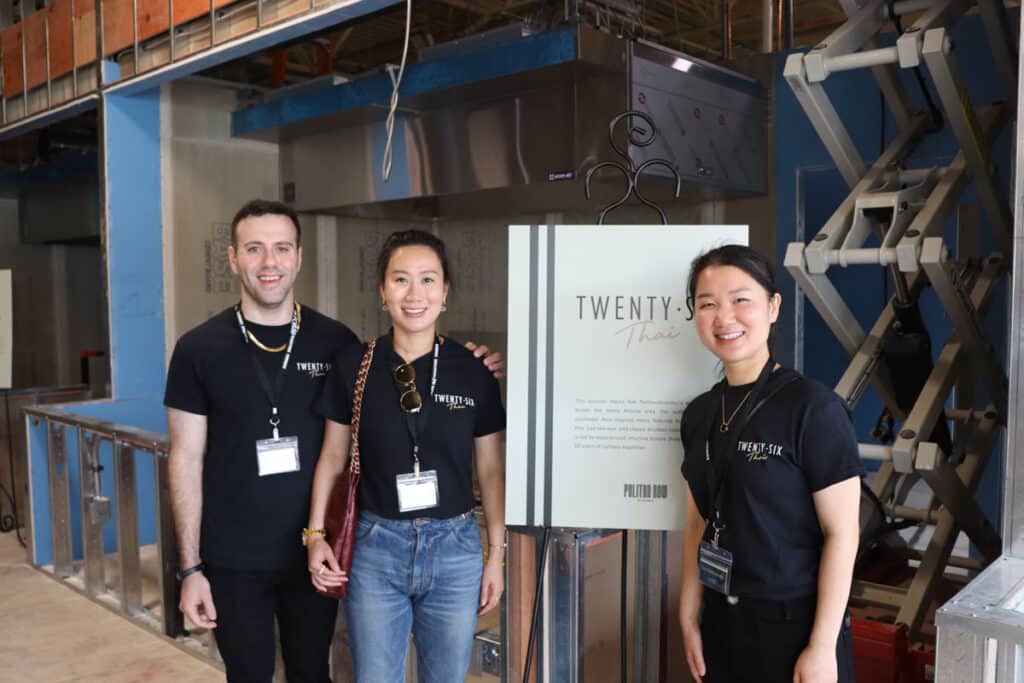
“There are certain types of produce and protein we try to source locally, but sauces and the more exotic produce and herbs, we have to import from Thailand,” she said. “Our brand is trying to move towards doing things locally and sustainably.”
Working with organizations such as Georgia Grown limits the use of large food distribution companies. Since starting Twenty-six Thai in 2016, Pattharakositkul has launched seven locations across metro Atlanta, including at Politan Row’s Ashford Lane and Colony Square.
The eatery describes itself as an “authentic wok-fired Southeast Asia-inspired menu featuring items such as pad Thai, pad see ewe and classic drunken noodles.”
Sheesh, a Mediterranean concept that uses simple, wholesome ingredients prepared with unique spices and blends, is run by corporate executive chef Charlie Sunyapong and director of operations Raquel Stalcup. The two are also members of the group behind full-service restaurants Stäge at Town Center and Pêche at the Forum.
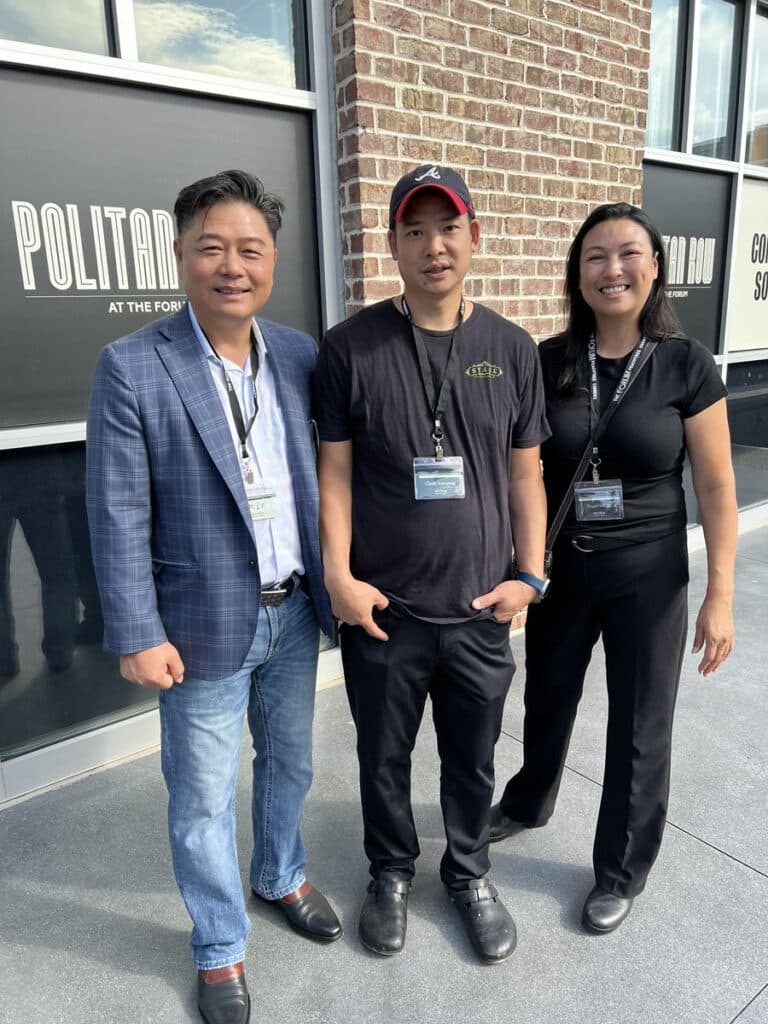
The popularity of those suburban concepts has already taken off. With Sheesh, they’re looking to do something different.
“There are going to be some things that are unique to Sheesh that you’re not going to get at the other places,” said Sunyapong. “You’re not getting a whole restaurant; this is quicker fare.”
Gekko Kitchen, a former food truck transformed into a hibachi and ramen experience, will be serving fresh, fast bowls that are more colorful and lighter than traditional hibachi fare.
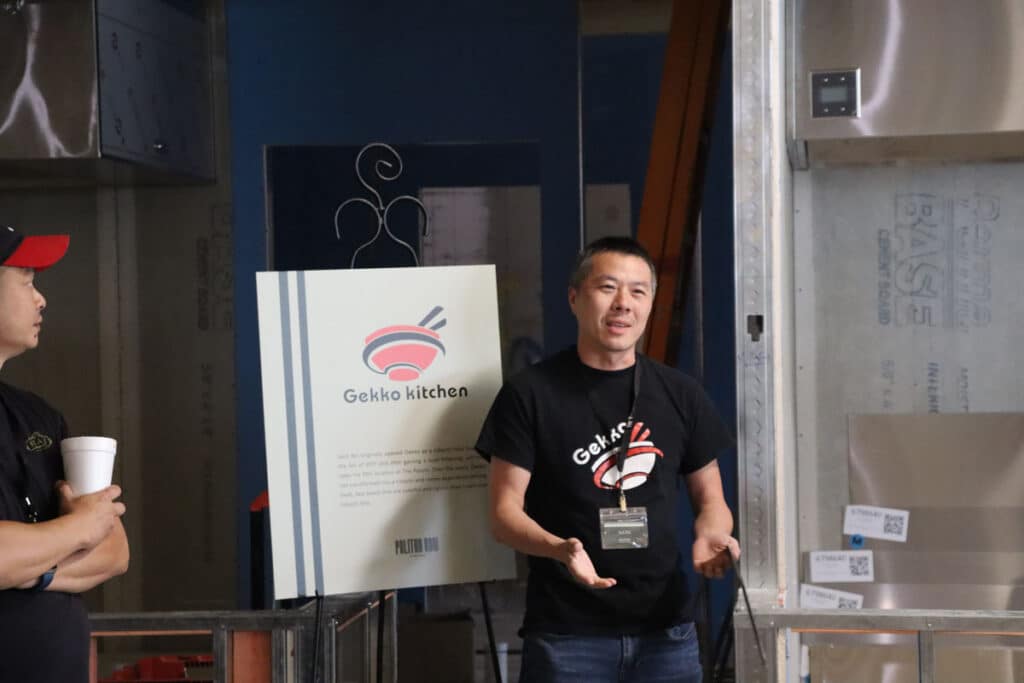
Gathering spots
Development Manager Nick Lombardo explained that NAP is moving away from building big construction projects from scratch like Colony Square in Midtown Atlanta and Avalon in Alpharetta.
“As a company, North American Properties pivoted around 2020 from building big ground-up construction to more redevelopment with already existing properties,” he said. “With the thought of great assets that just need a little more attention Infused into them to create value, we bought the Forum in 2022.”
He said that value-add propositions done at The Forum will create a more walkable center.
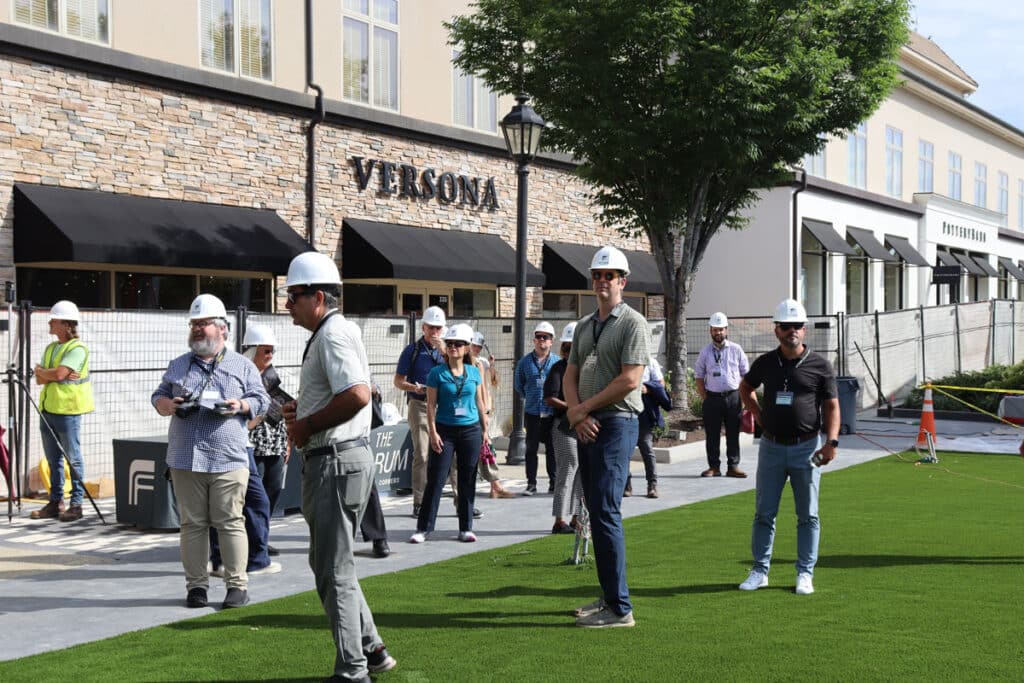
“Trying to compete with the internet on convenience is a very tough task, so the way we differentiate is by experiences,” he said. “We host between 150 to 200 events every year. We have things like concerts, wellness and fitness events and we have child playtime events. Our marketing team does a great job and they’re the differentiator when it comes to what makes our property stand out.”
By the first week of August, a large gathering space will be unveiled in the central area of the property between Pottery Barn and seafood restaurant Pêche. It will have a nine-foot LED screen capable of hosting movie nights and sports viewing. There will also be musical performances featuring local artists.
“We’re not in competition with Town Center,” said Charlotte Hinton, marketing manager at The Forum. “Town Center has gates like a real music festival and we’re more like a ‘chill and enjoy the music’ vibe where you can grab a beer and hang out or maybe kind of walk around.”
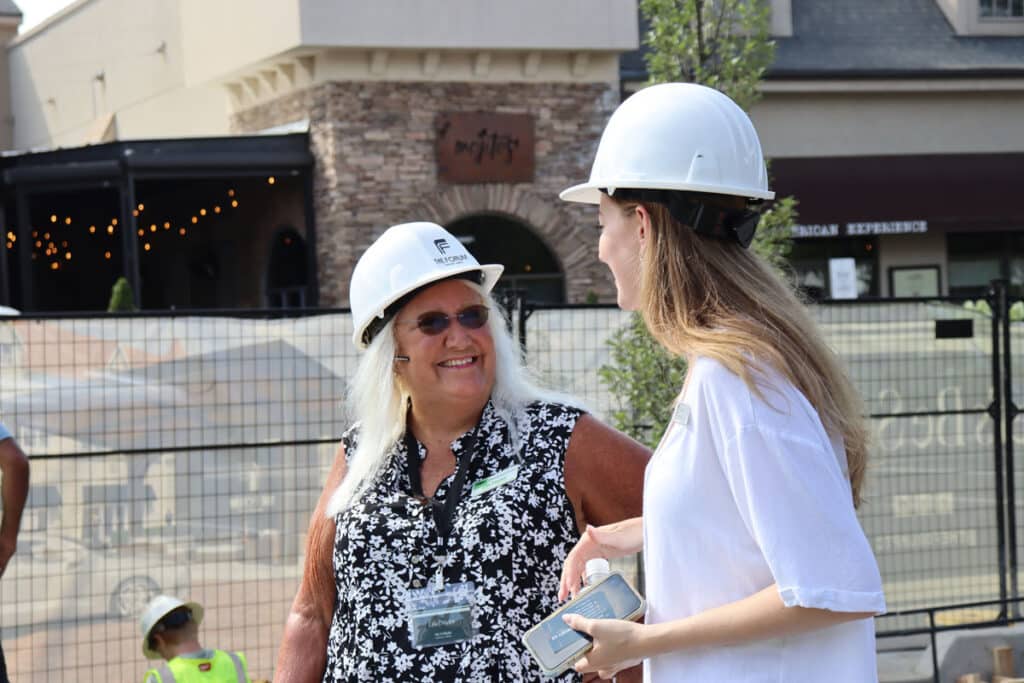
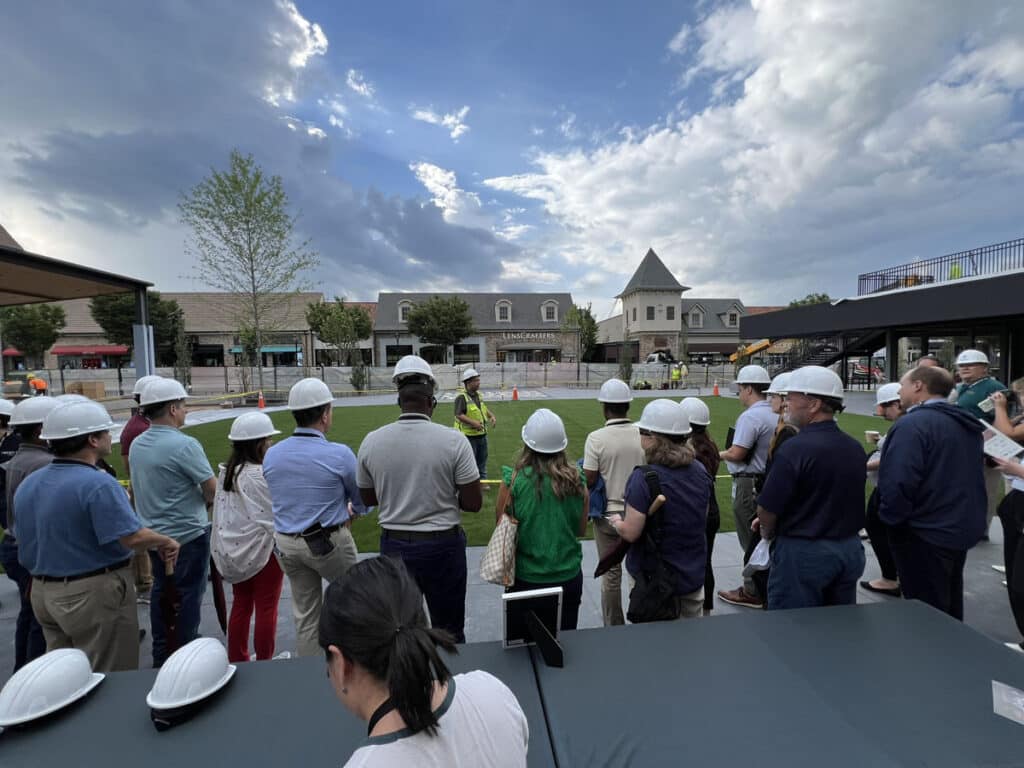
The smaller space and artificial turf are unlike the Town Center space where attendees spread blankets and bring chairs. The Forum will have furniture and seating in the space so folks can just gather and either enjoy time with family or partake in events.
The Forum will also offer valet parking on a limited schedule at that end of the property.
More improvements
Although the construction equipment will have moved out, the jewel box building will house a yet-to-be-named restaurant that will open early next year.
“We’re pretty much done with what we’re doing as far as landlord work,” said Lombardo. “We ask our tenants to bring their brand and their design and their material pallet and put that on the building to express their brand identity. They know their brand better than we do. They know how to best design their building and how it functions and works.”
It’s the same process with retail stores, he added.

“We always ask all of our new tenants to come in here when they’re building their storefront,” he said. “They’re not just selling their clothes; they’re selling a lifestyle in the brand so we ask them to push their brand out to the street.”
Even with the new spaces, there will be no shortage of parking, Lombardo added. “There’s plenty of parking behind these buildings,” he said pointing toward Pêche. “What we’ve done is enhance the connectivity to those areas. We’ve redone this breezeway and we’re adding lighting and connecting the parking lot to the main boulevard here. The goal is to replace cars with people and activity and bring a sense of community to the property.”
Related
Business
Taste of Peachtree Corners: PCBA Showcases Local Restaurants
Published
1 week agoon
July 17, 2024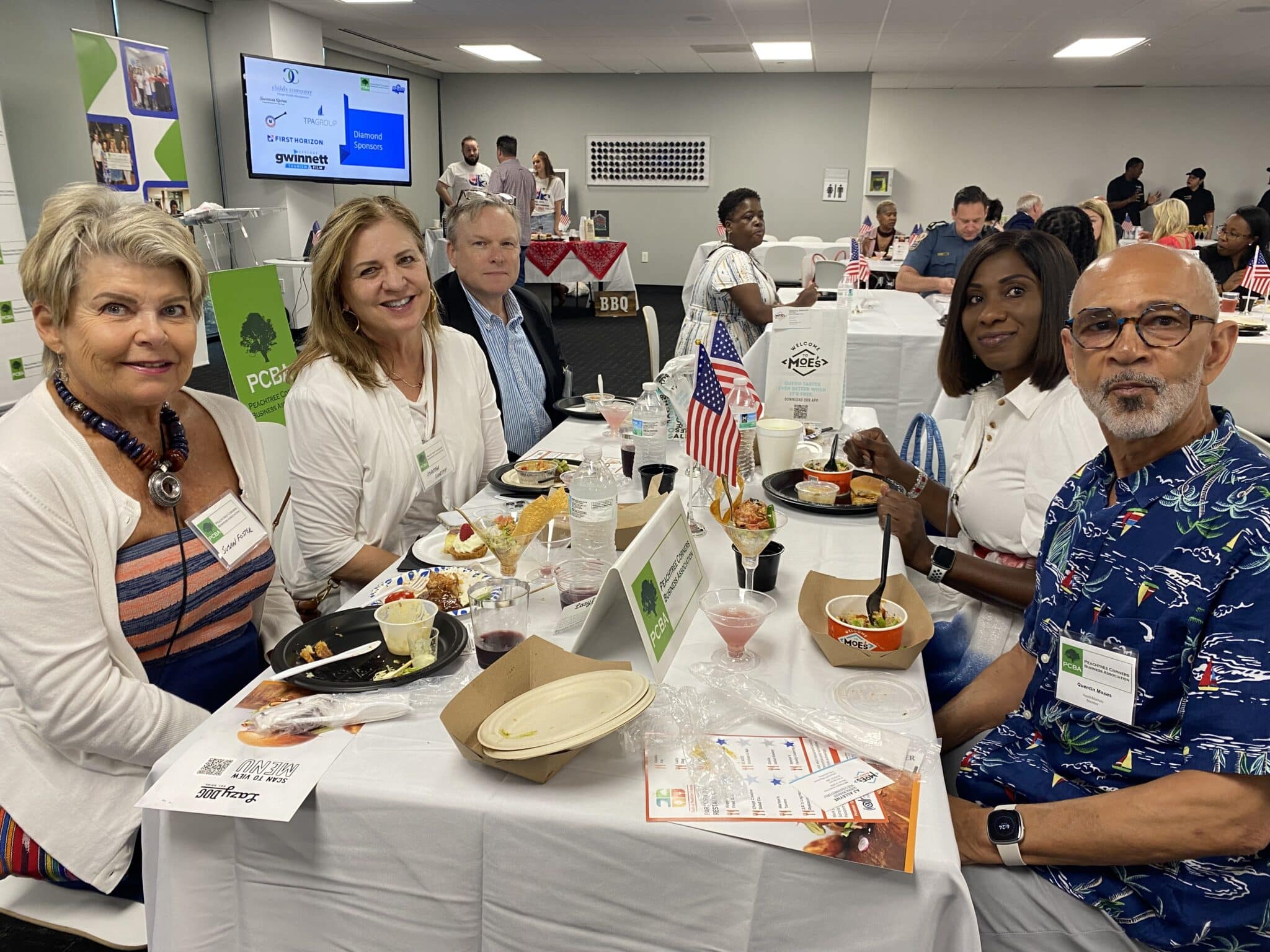
The Taste of Peachtree Corners has been in the works for years, but the COVID-19 pandemic put many key events on hold for the Peachtree Corners Business Association (PCBA).
But luckily this year, the dedicated staff of volunteers successfully executed a memorable event and introduced a lot of local business owners to their neighboring restaurants and caterers.
As I walked up to the Community Chest Room at Peachtree Corners City Hall on June 27, there was a line outside the door. I later found out that over 100 people had registered to attend the event. I got checked in quickly and was faced with a “passport” of 10 Peachtree Corners restaurants serving everything from high-end bakery items to good old-fashioned barbecue, and modern twists on seafood and American cuisines.
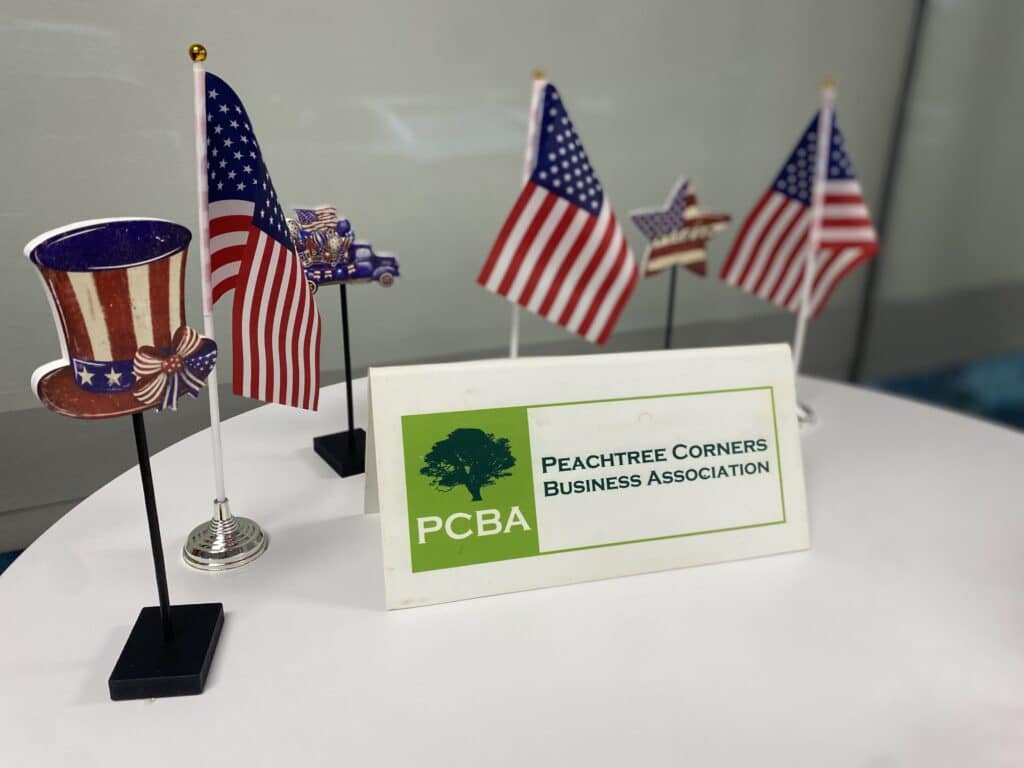
Let’s talk about the food
The idea was to visit all 10 restaurants and collect stars while trying samples and small plates. My first stop was Firebirds Wood Fired Grill, and they had my favorite – homemade chips and queso. The queso was smoky and mildly spicy with a great depth of flavor. What a great start. Next up was Chopt. Creative Salad Co. I had never heard of this restaurant before, but they blew me away with a perfect amuse-bouche of cherry tomato, pesto, mozzarella, and olive oil. These guys understand simple and fresh Mediterranean flavors.
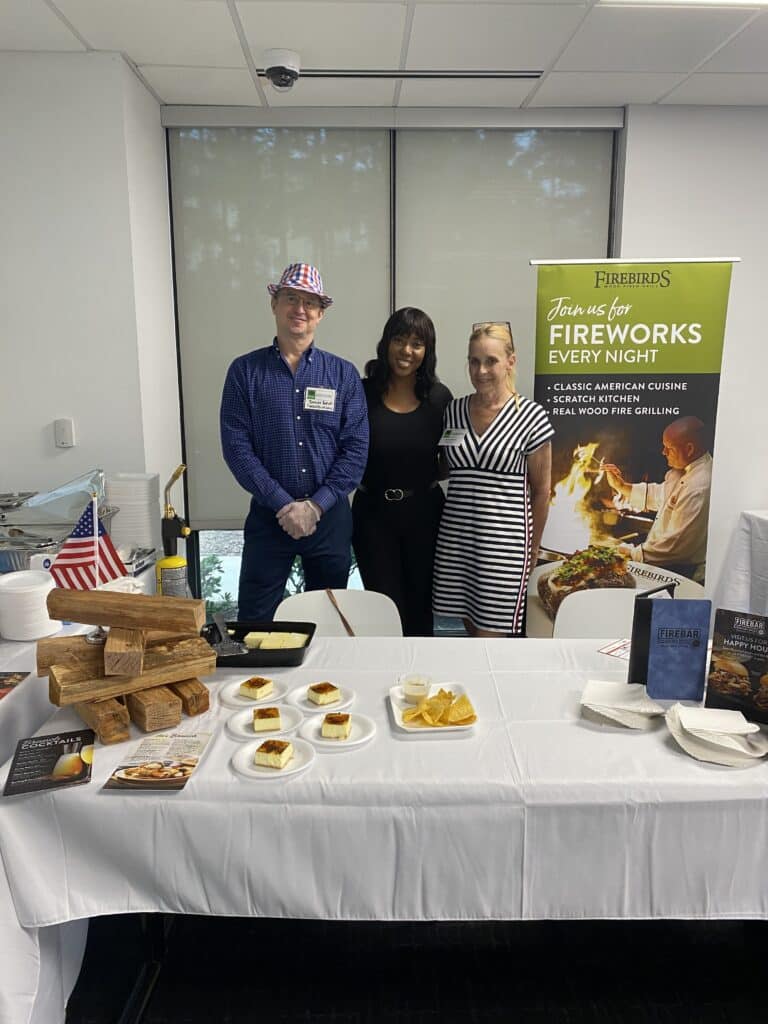
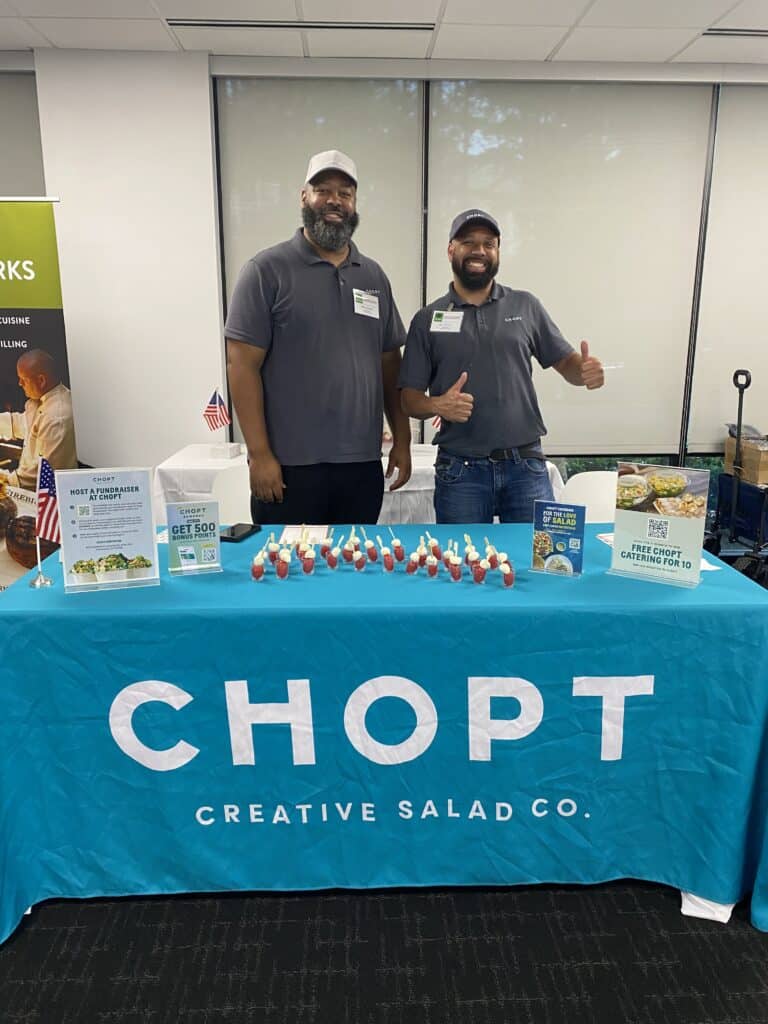

The folks from Marlow’s Tavern were also on-site serving shrimp and grits with jalapeno, spinach and tomato beurre blanc. This is definitely the style of elevated food I’ve come to expect from Marlow’s. And as a nice touch, they prepared a refreshing blueberry cocktail.
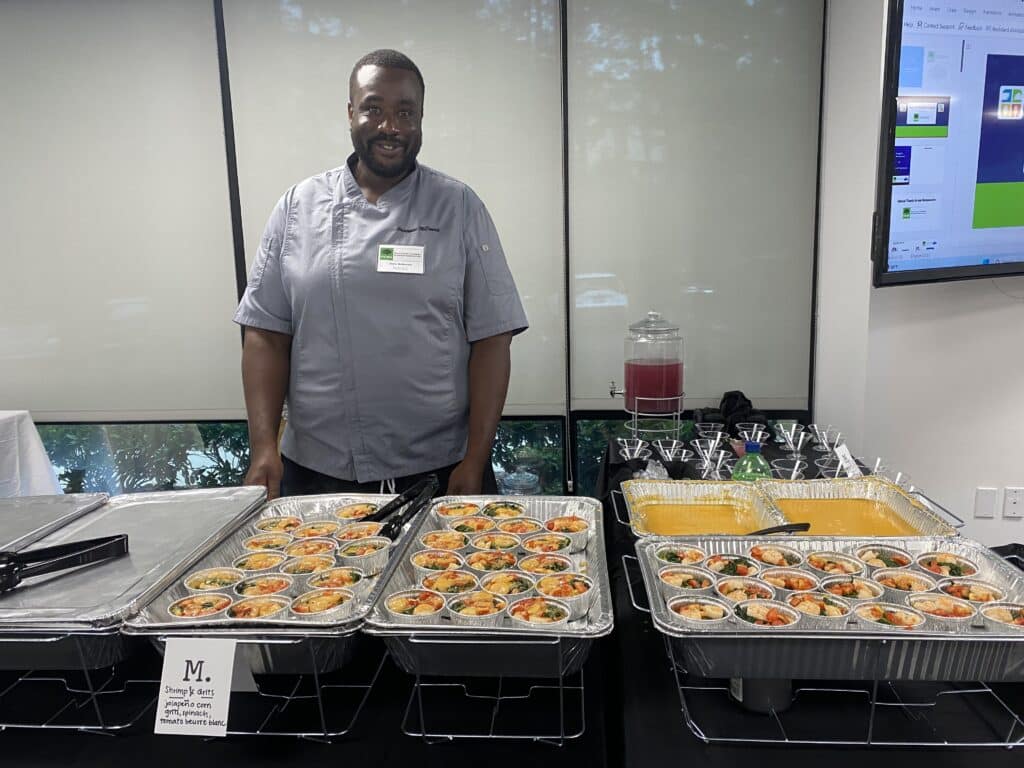

Another familiar face was set up on the other side of the room. J.R.’s Log House Restaurant served southern favorites like pulled pork sliders, baked beans and mac n’ cheese. I couldn’t pass this one up. The pulled pork was tender, tangy and saucy. Exactly what I want from a barbecue. Lazy Dog’s table really impressed me with its presentation. The tuna cup with rice, avocado and chili with chips on the side, was a real stunner.
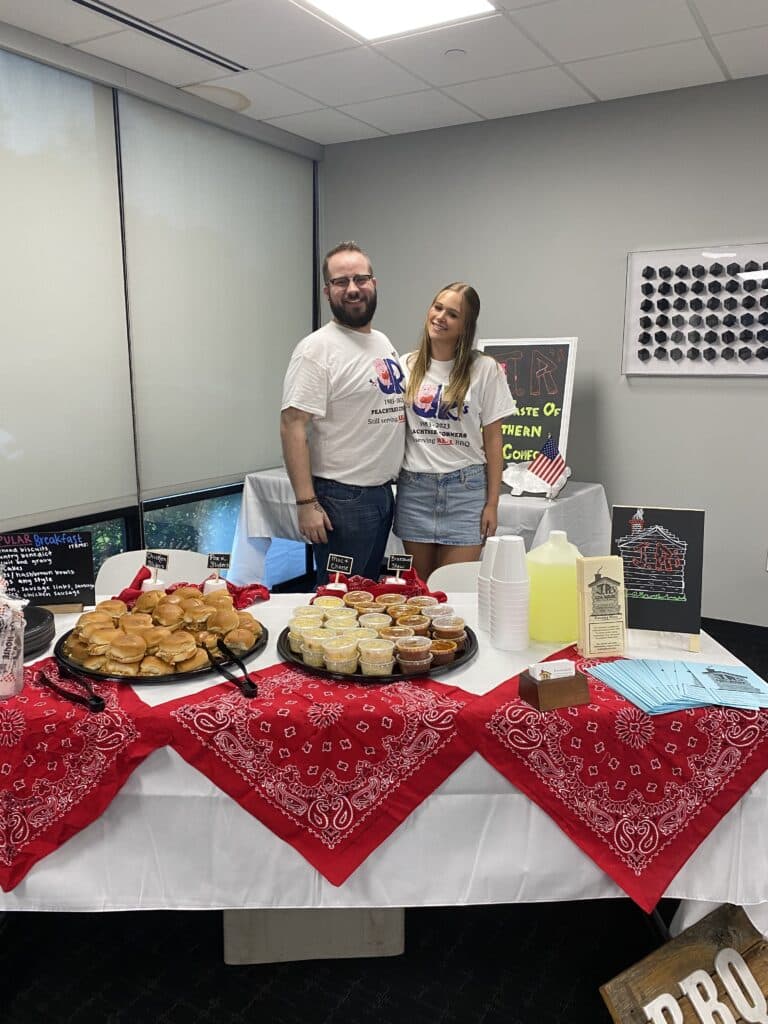
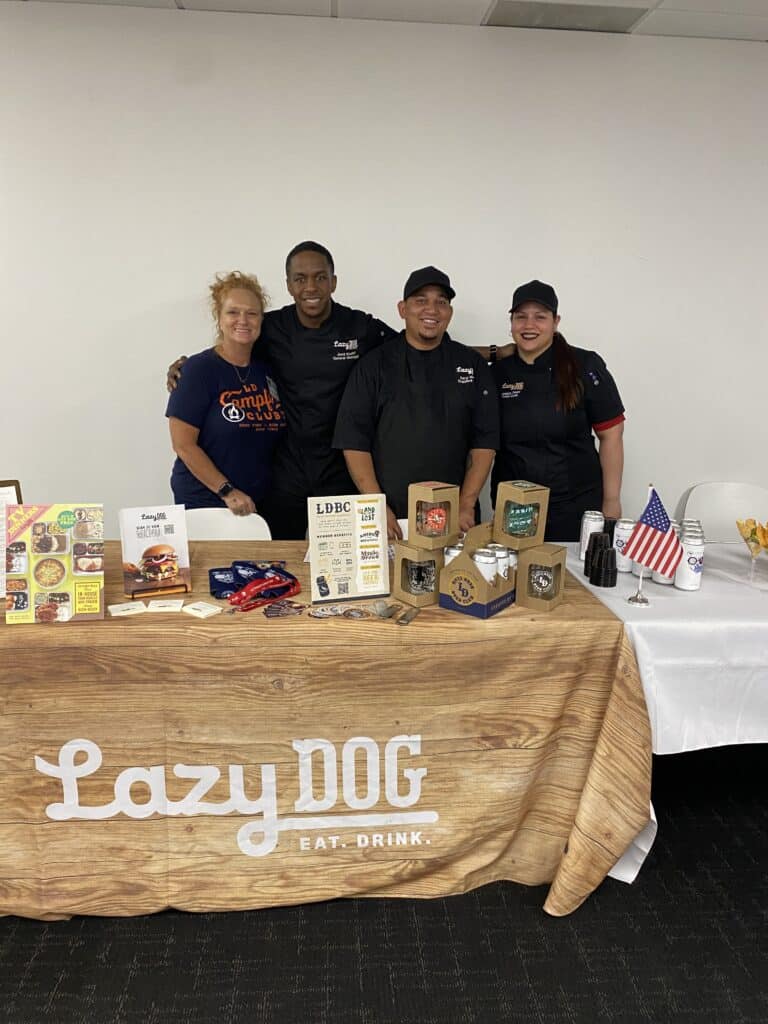
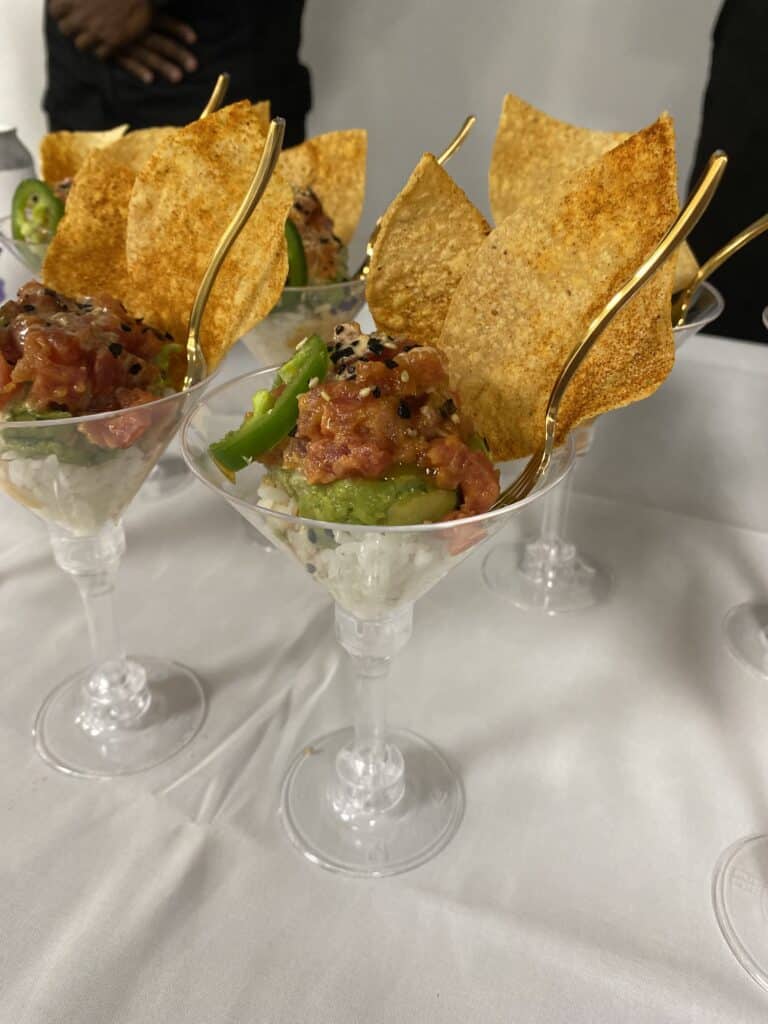
Moe’s Southwest Grill was also on-site handing out tasty tequila lime chicken with rice, avocado, and black beans. This super hearty and comforting entrée was followed by a seafood course from PECHE Modern Coastal. Crab cakes with a croissant pinwheel, roasted garlic and lemon aioli and arugula were on the menu and the flavor combinations were simply fantastic.
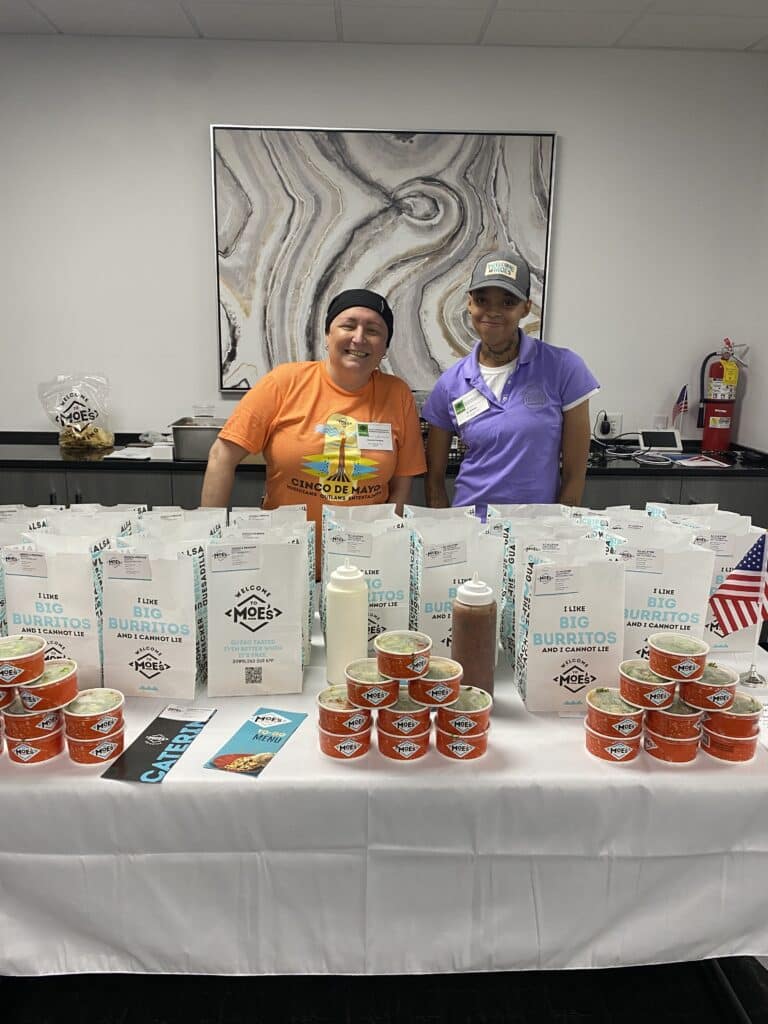
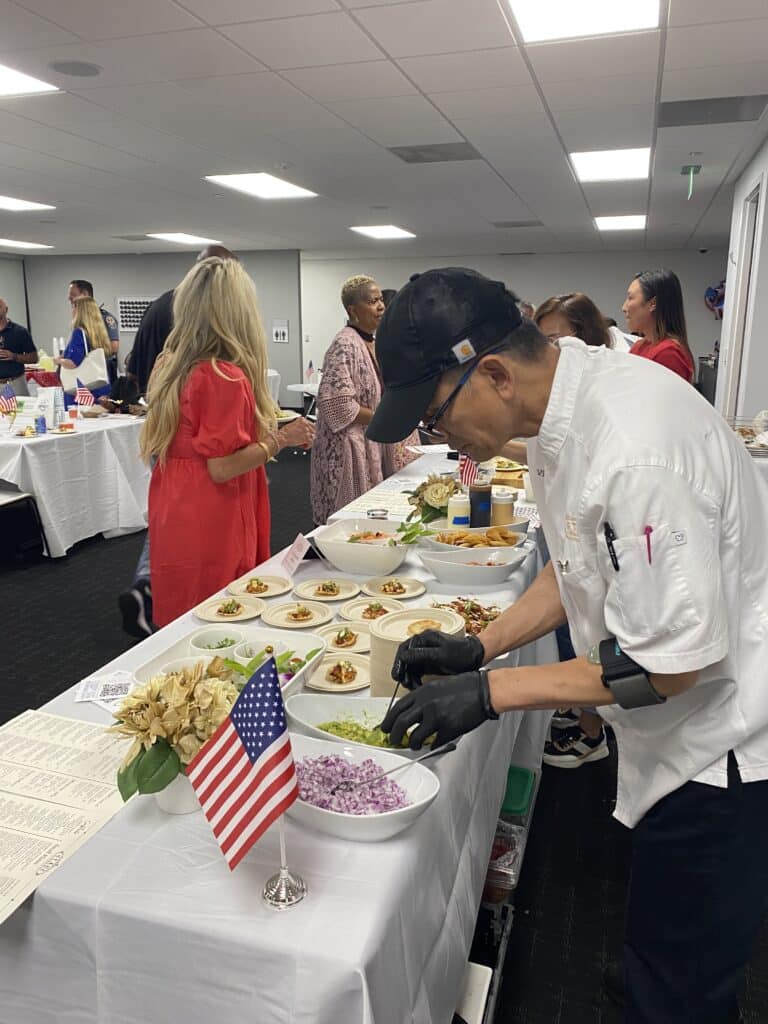
PECHE’s sister restaurant STAGE Kitchen & Bar was next door offering a tuna and salmon tostada with avocado, eel sauce, spicy mayo, and cilantro. This was easily one of my favorite bites of the night. The tostada was crunchy and light with clean and bright flavors. No kidding, I could probably eat this every day for lunch.
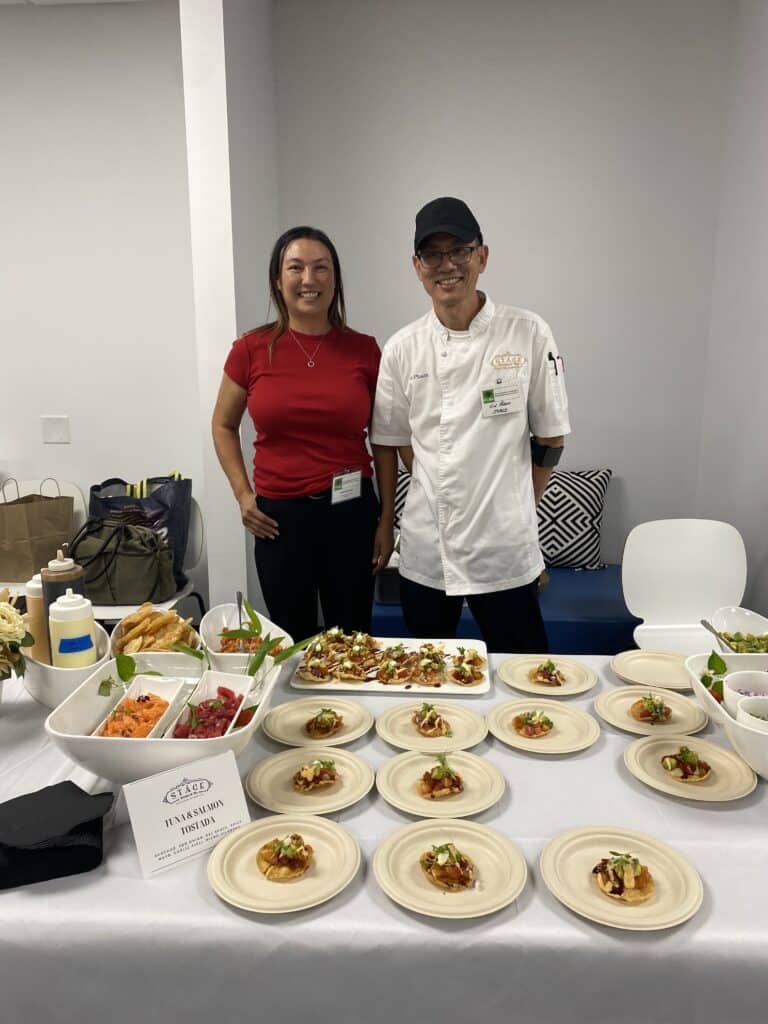

I moved on the Smoke’s Family Catering and owner Phillip Smoke had whipped up enough barbecue to feed an army. I had the pleasure of trying the smoked chicken with potato salad and it was the perfect pairing. Last but not least: dessert. I capped off the evening with a beautiful chocolate ganache-filled croissant with perfect lamination and flaky texture.
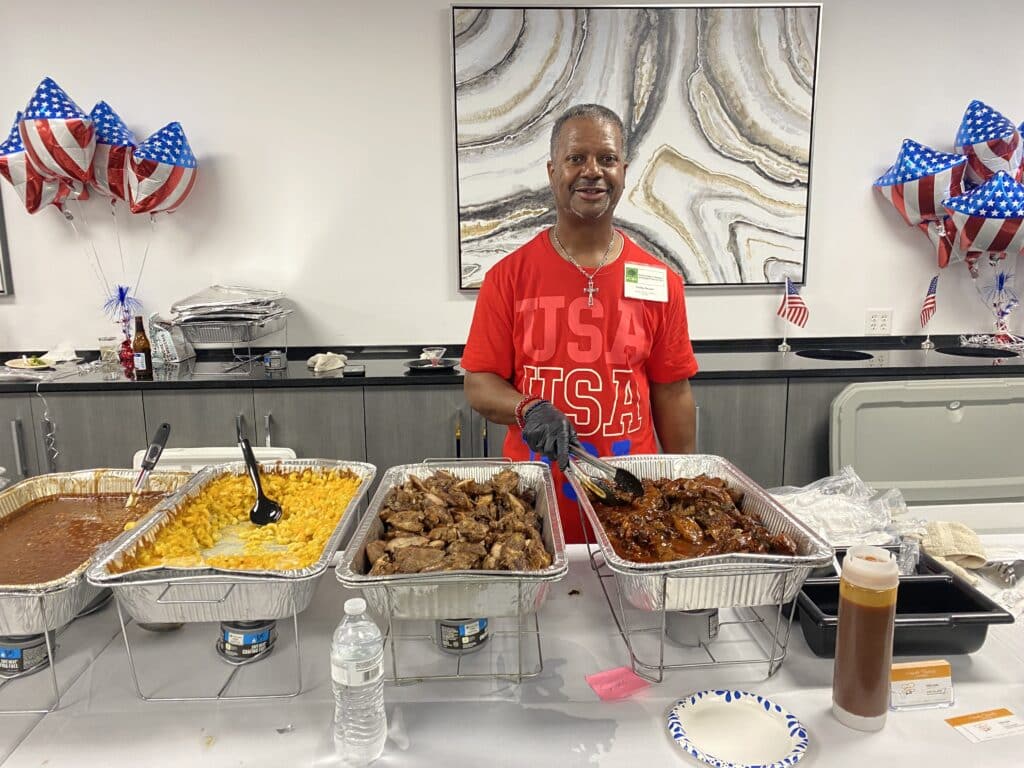
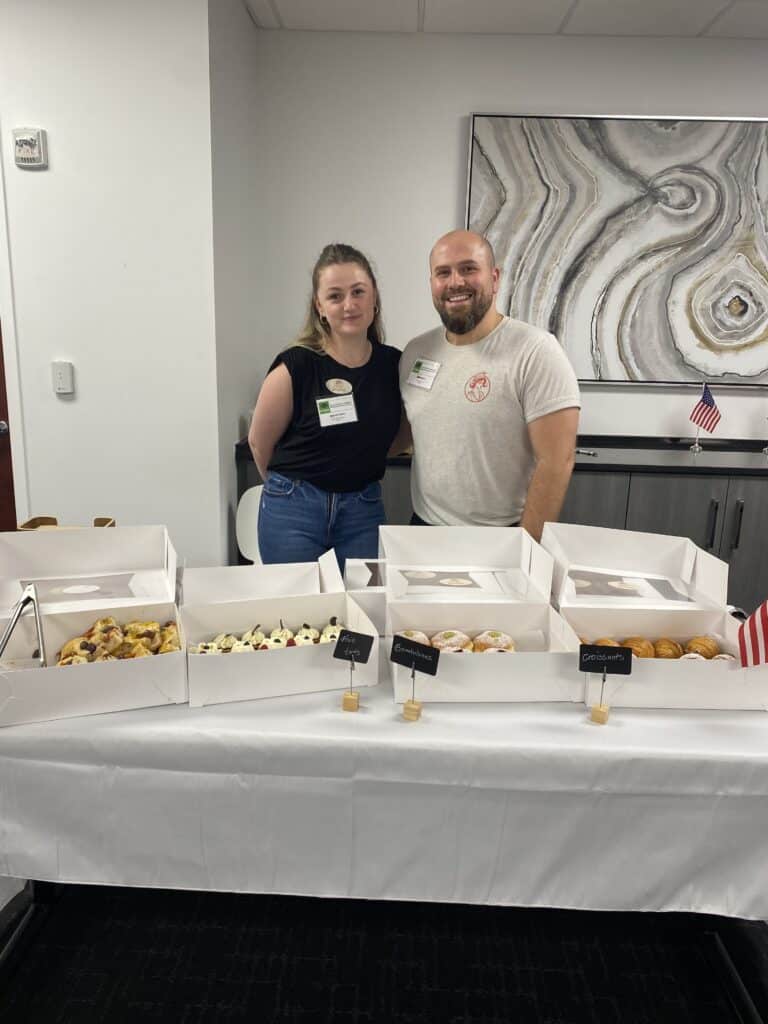
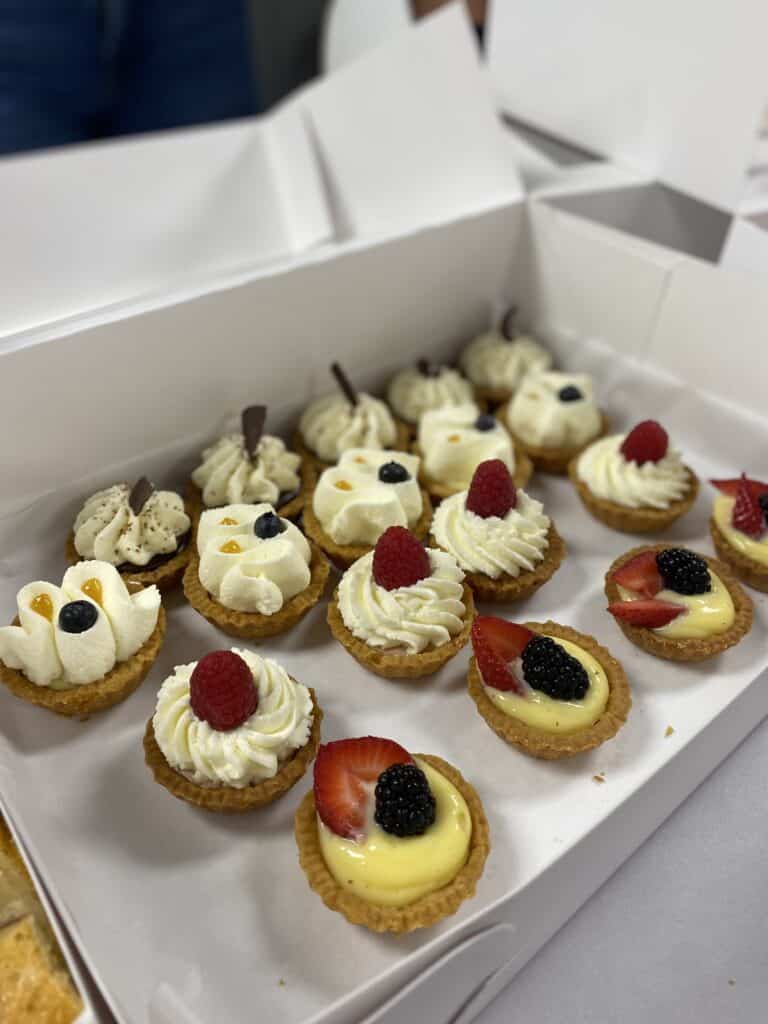
The inspiration behind the event
With a (very) full stomach, I caught up with PCBA President Lisa Proctor to talk about the event.
“We knew that COVID was really hard on a lot of our restaurants to get people back in,” said Proctor. “We wanted to do it in June because we wanted to celebrate our military. Everybody remembers them maybe on Memorial Day or different things, but June is the 80th anniversary of D-Day.”
“The military is always close to our heart,” she added. “We’re also very proud of our restaurants. They all have gone above and beyond.”
Tonight, the PCBA was honoring the Armed Forces and its brave veterans while bestowing two donation checks to very worthy causes.
The first check for $500 went to Folds of Honor. Since 2007, Folds of Honor has provided life-changing scholarships to the spouses and children of America’s fallen or disabled military. And now, their mission expands to the families of America’s first responders.
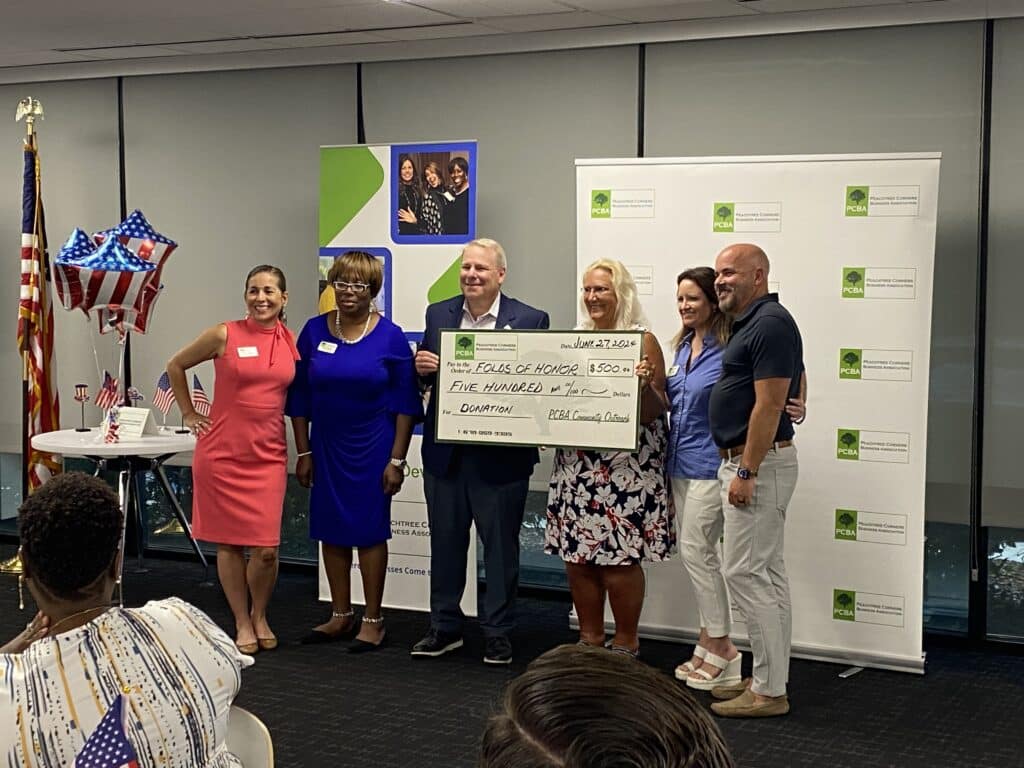
The second check for $500 was given to Light Up the Corners, a 501(c)(3) volunteer organization with an annual glowing, flashing, blinking, shining, nighttime running party and fundraiser in one. All proceeds from the event go to benefit less fortunate children and families in the Peachtree Corners community who are struggling by giving them the chance to participate in life-enhancing programs and activities at the Fowler YMCA.

Over the past 12 years, the PCBA has awarded 19 scholarships and donated more than $156,000+ back to the Peachtree Corners community.
Related
Business
Local Resident Opens AtWork Location in Peachtree Corners
Published
2 weeks agoon
July 10, 2024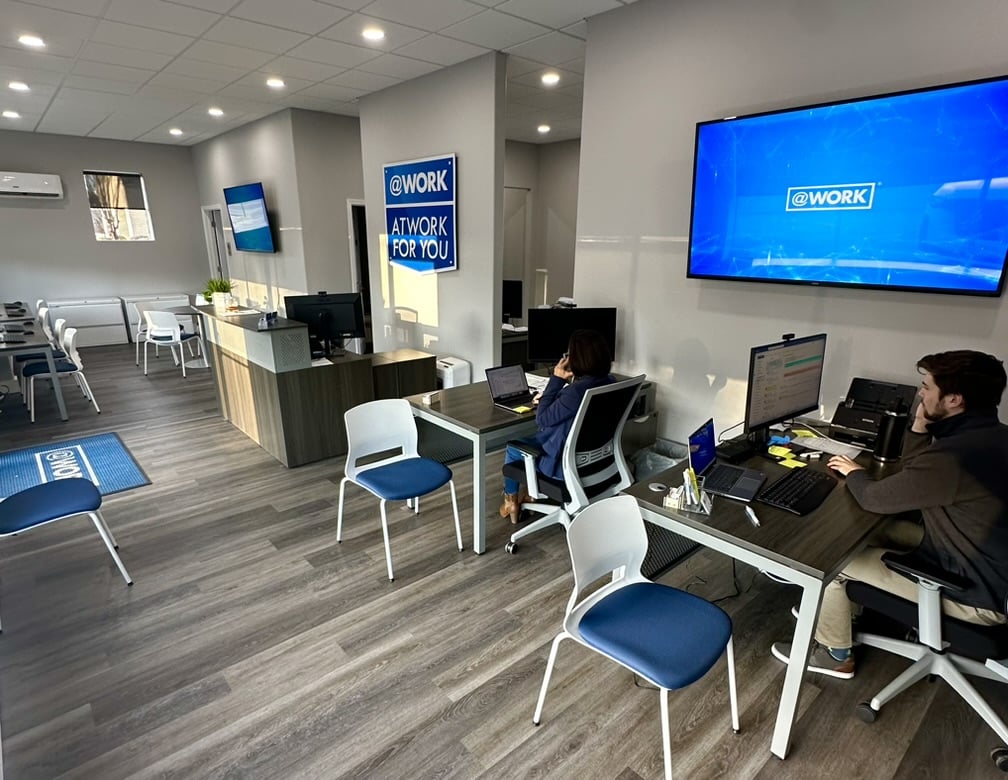
AtWork, one of nation’s leading staffing franchises, has opened its third Metro Atlanta location in Peachtree Corners, Georgia at 6185 Buford Highway, Suite E-100.
AtWork Peachtree Corners is locally-owned by Kamal Bhatia, an immigrant from India with decades of experience in hospitality and as the Senior Vice President of Operations of Atlanta-based Action Bartending School.
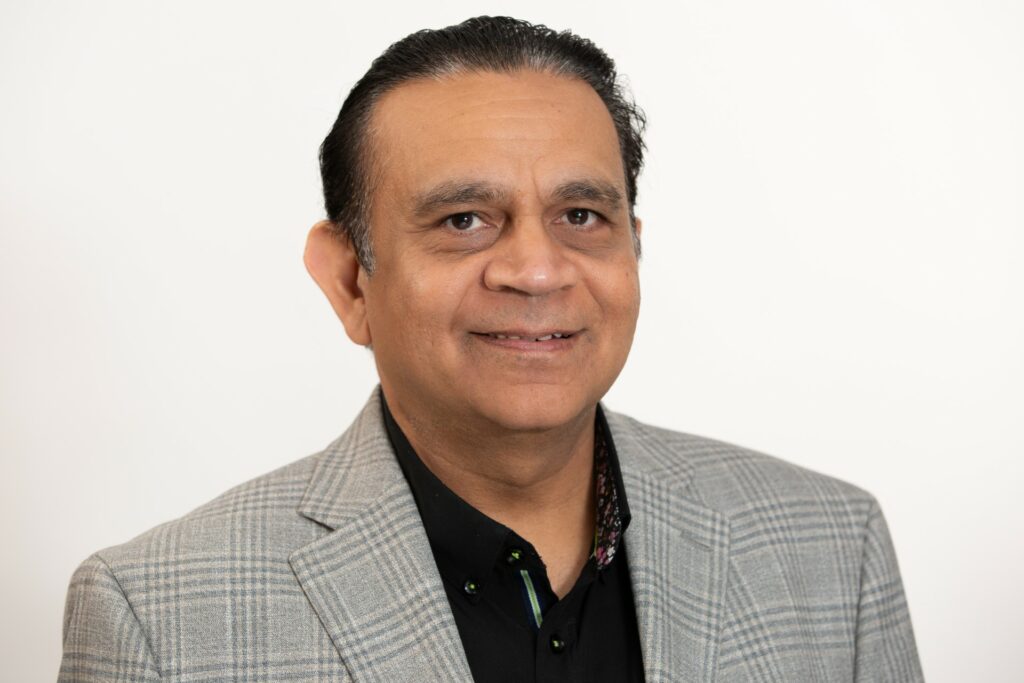
“There is an incredible need for AtWork’s services in Peachtree Corners,” said Bhatia. “Since migrating here in 1996, I’ve witnessed Atlanta evolve and sprout new communities north of the city, including my own. Peachtree Corners has become a hub for thriving businesses, and my goal with this location is to be a key resource between companies and job seekers to support the continued growth of our local economy.”
Bhatia’s son and daughter will assist him in the business.
“This is an opportunity to create a legacy company to ensure our community is supported for generations to come,” he said.
For more than three decades, AtWork’s mission has been to connect people with jobs and jobs with people. With more than 100 locations nationwide, AtWork puts nearly 40,000 individuals to work each year in administrative, light-industrial, accounting and finance, hospitality, IT and management-level positions at some of the nation’s largest and most recognizable companies.
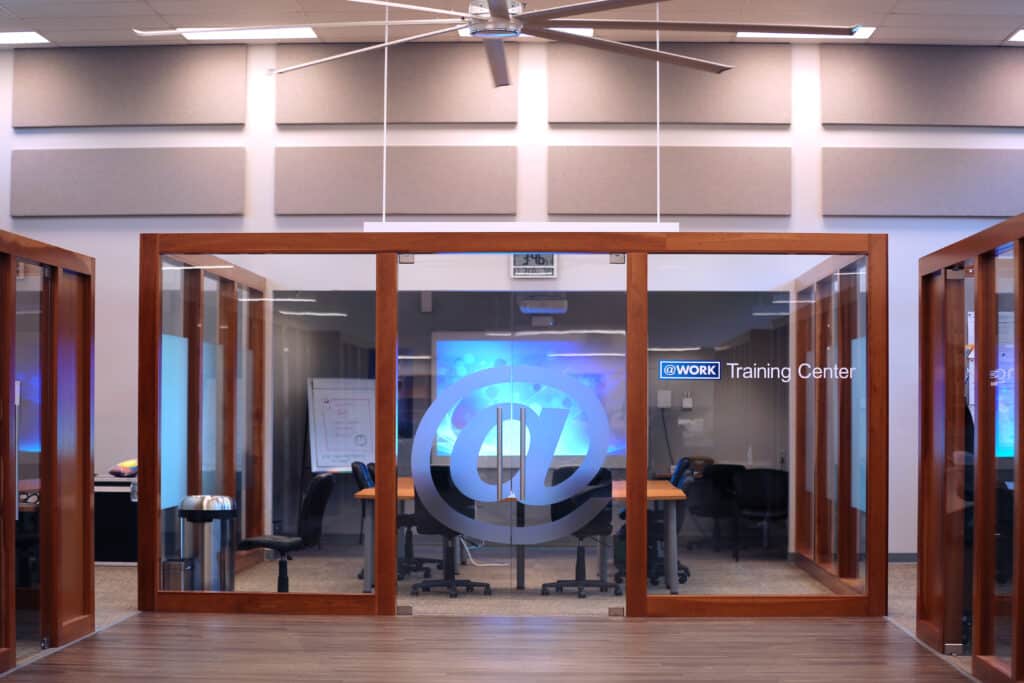
“We’re proud to open our doors in Peachtree Corners and provide a common place for both job seekers and growing businesses to turn for staffing solutions,” said Jason Leverant, President and COO of AtWork.
“AtWork will serve as a key resource to help employees thrive, businesses prosper and communities flourish. Kamal is the perfect partner to champion our mission and be a servant leader in her local community,” he added.
Related
Read the Digital Edition
Subscribe
Keep Up With Peachtree Corners News
Join our mailing list to receive the latest news and updates from our team.
You have Successfully Subscribed!

What’s going on at Jones Bridge Park and the Challenges of Urban Development

Taste of Peachtree Corners: PCBA Showcases Local Restaurants

The Forum Gives Sneak Peek of New Eateries and Community Spaces

Southwest Gwinnett Mayors Share Visions for the Future

8 Events Happening In and Around Peachtree Corners This August

Peachtree Corners Shines Bright with Light Up the Corners Glow Race this August

Peachtree Corners Shines Bright with Light Up the Corners Glow Race this August

The Forum Gives Sneak Peek of New Eateries and Community Spaces

8 Events Happening In and Around Peachtree Corners This August

Southwest Gwinnett Mayors Share Visions for the Future

Taste of Peachtree Corners: PCBA Showcases Local Restaurants

What’s going on at Jones Bridge Park and the Challenges of Urban Development

Local Resident Opens AtWork Location in Peachtree Corners

CHRIS 180 Expands its Services into Gwinnett County [Podcast]

Light up the Corners [Video]

Capitalist Sage: Business Leadership in Your Community [Podcast]

Cliff Bramble: A Culinary Adventure through Italy

Top 10 Brunch Places in Gwinnett County

A Hunger for Hospitality

THE CORNERS EPISODE 3 – BLAXICAN PART 1

Top 10 Indoor Things To Do This Winter

The ED Hour: What it takes to Remove Barriers from Education
Peachtree Corners Life
Topics and Categories
Trending
-
Business1 week ago
Taste of Peachtree Corners: PCBA Showcases Local Restaurants
-
Business2 days ago
The Forum Gives Sneak Peek of New Eateries and Community Spaces
-
City Government4 days ago
Southwest Gwinnett Mayors Share Visions for the Future
-
Around Atlanta4 days ago
8 Events Happening In and Around Peachtree Corners This August


